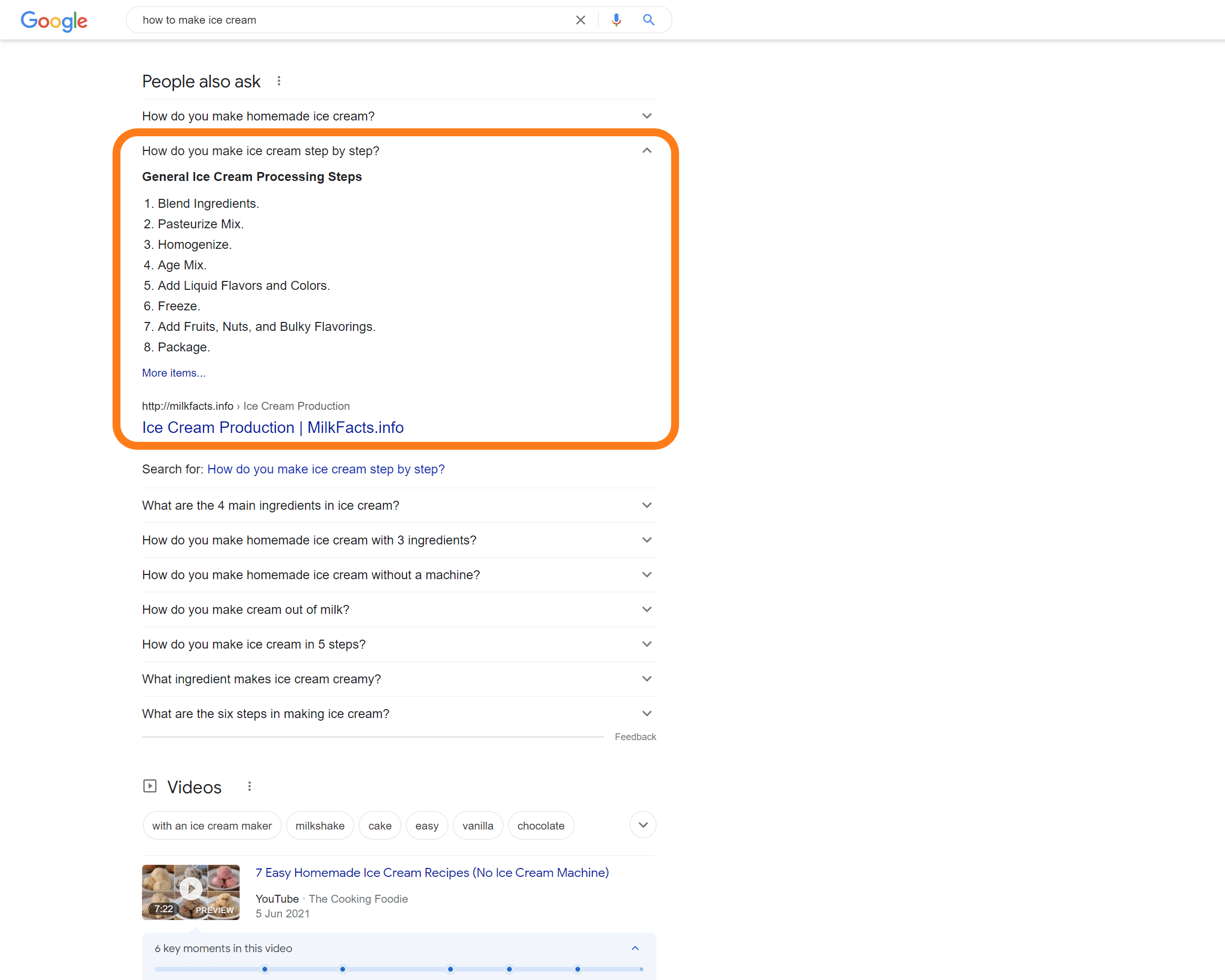Perfect Your Content Strategy for Google Search Features
Great content can help you accomplish multiple business goals. It can help you attract your ideal customer, for the foundation of your lead generation strategy, and grow your business.
With a large chunk of website traffic coming from search, focusing your content creation process on ranking as high as possible is a clear priority. We all know that appearing in the first few results on the SERP is key to getting traffic and building your brand.
However, the specifics on how to do that are opaque.
In this article, we’ll help you understand more about the different Google search features available. You’ll learn about Google My Business, featured snippets, and rich results. You can then determine if optimising for these displays is worth the risk of a growing trend - zero click searches.
How Search Engines Work
Google has one big mission in life - to always provide its users with the most relevant and useful information in response to their questions.
When you enter a query in the search bar, Google’s algorithm returns a ranked list of answers. Items at the top of the search engine results page (SERPs) are those Google has determined are most likely to answer your needs.
Results come in one of two forms. There are the standard blue links we all know and love. However, as Google continues to develop its offering, there are also an increasing number of search features.
Search features display key information to users directly on the search page. They come in a variety of formats, depending on the type of search you are conducting. For example, if you’re searching for information, Google will often return a definitive answer as a snippet. If, however, you’re searching for a business or shopping online then you might receive local results and product listings.
No doubt you've seen these results before, even if you didn’t know the right name for the feature. As the results continue to diversify, many marketers wonder if they can optimise content to target these features. The answer? Yes, and no.
Search Engine Optimisation
SEO, or search engine optimisation, has been a standard digital marketing practice for many years. By balancing the focus of their content marketing strategies, marketers can target both keywords and the needs of their audience to influence their ranking on SERPs.
Typically, you will focus first on writing content designed to help you rank organically.
Your content strategy should start with your target audience, not the search engines, in mind. When you know who your audience is, you can address their pain points and interests in your content.
Then you can dive into keyword research. By picking out the specific search queries your target audience is searching for, you can develop key content topics. Then, when you create content, you can have a clear direction that is reflected in your SEO strategy.
When publishing your content, your team will focus on other on-page SEO factors that improve your chances of ranking. Think structuring your pages using keyword laden headlines and sub-heads, the use of H tags and bulleted lists. There are also lots of backend elements - like your URL, meta descriptions and meta titles - that can further strengthen your SEO strategy.
Paid Search and Google Ads
Waiting for your content to rank organically can take time. For highly competitive keywords, you might always find it hard to beat more established players.
But, if you've got the budget, you pay to appear at the top of the page. This strategy can bump you right to the top of the page.
Some of Google's search features are also advertising driven. These are shown when Google deems a user's search intent to be transactional.
If you search for 'printer paper', your top search results will be links to companies selling the item you need. You will also see a search feature, including specific product listings. These can be particularly eye-catching as they include additional information, such as a picture, price, and user ratings of the company or item.
Search for 'hotels in London' and you'll see how powerful local ads can be. Users can filter results by availability of their travel dates, guest ratings, price, offers, and other factors.
Google ads help you perfect the customer experience and bring your audience to the right page. Online advertising on Google or social media can also be customised for every stage of the buyer's journey.
Google My Business and Local Listings
One of the most recognisable search features is generated by a Google My Business listing. It's likely you already have a Google My Business profile. If you don’t, create one right away.
The Google My Business listing works with both regular searches and Google Maps searches. It allows your business to appear when someone searches “near me” or in a specific geographic area. The more detailed and built out your profile is, the more authority Google places in your business.
Besides the map pack, your profile will also include a knowledge panel that appears on the right side of the search screen. This includes things like your reviews, hours of operation, brief business description, and contact information. It can also include links to your social networks, photos of the business, and news updates that you post.
Being active on your Google My Business profile is important. Even if you're not a traditional brick and mortar store relying on local footfall, you could miss out on valuable local search traffic. If you don’t have a Google My Business profile, it will be hard for new leads and potential clients to find your business.
If your profile is bare bones, make a plan to update it regularly. Adding new photos, replying to reviews, and adding new posts all work to show the algorithm you are active and reputable. By optimising your profile, you can appear higher on maps results and in regular searches. This is essential to promoting your business, getting found organically for local SEO, and improving your search engine ranking results.
Featured Snippets
A featured snippet is also referred to as an answer box. This search feature is a summarised answer to the user's search query.
The featured snippet appears in a box above the first linked search result, so being the source of the featured snippet allows you to rank above the first organic result. If your user is using voice search, the featured snippet is what the assistant will read out to them.
There is only ever one featured snippet, so it’s tight competition to get that top spot. It provides your company with more SERP real estate, as the box is larger than a typical link.It is made up of a brief answer with bold keywords, a linked title, and the page URL.
While being in such a prominent position might help you get more clicks, this is debatable (as we will discuss later). More important, perhaps, it helps increase your authority and brand awareness with searchers.
How to get a featured snippet?
Featured snippets offer the user a 'definitive answer'. Keep this in mind when writing your blog posts and pages.
Start with your target specific keyword or question. Then, you need to answer the question quickly, usually with the help of a specific headline with that keyword.
Provide answers to the questions searchers are asking. Use services like SEM Rush and Answer the Public to research what these are.
Snippets include a short paragraph that summarises the answer, so make your writing clear and concise.
They might also include bullet-points, so use these if possible.
The featured snippet box only displays limited characters, so you will need to optimise your answer to be informative and to entice the user to click through.
Rich Results
If you've ever searched for your favourite movie, you've seen a rich result. They commonly appear for things like books, music, recipes, and articles, but come in many forms.
For example, if you're a Google News approved website, your articles can appear in the Top Stories box in relation to a search query. Searching for an organisation will sometimes generate a Knowledge Panel, including key information such as key personnel, contact information, and headquarter location.
Rich results are particularly enticing for users, and work well with voice search. Typically, they have interactive or visual features. That can include things like carousels, related questions, images, tables, events, job listings, knowledge panels, or ratings.
In order to get rich results, you need to add structured data to your content. Schema creates a standardised format that helps Google to understand the nature of the information provided on a page and how to display it.
Schema markup depends on backend efforts, not on-page, contextual SEO. You will need to use Google’s Data Markup Helper and add the resulting code to your pages, so companies often work with a developer to add it. However, if your website is built on Wordpress, there are plugins that can help.
Zero Click Searches
With the increase in featured snippets and rich results, we're seeing an increase in zero click searches.
In the past, when a user entered a search query, they had to click on a link. Now, the user can often answer their query without having to click through to the website providing the answer. The featured snippet or rich result answers the question on the search result page.
This creates a bit of a dilemma. On the one hand, you're targeting prime search real estate. On the other, you potentially lose traffic.
If you want more website visitors, you might not want to focus too hard on targeting featured snippets. Instead, focus on targeting your content to attract people who want more detailed answers to their queries.
However, if you want to increase brand awareness, featuring in the top positions on the search results pages might be a better focus.
As always, think through your goals and determine whether alternative search strategies are best for you. There are advantages and disadvantages to each solution. When you know what your end game is, you can diversify your content strategy and discover the best approach for your brand.
Improve Google Search Results with 1827 Marketing
Optimising your content for Google’s search features can help you increase brand awareness and be an authoritative source. The goals you set and the marketing approach you take depends on your individual business needs.
If you are looking for support with your content strategy, 1827 Marketing is here for you. We can help with everything from SEO focused content creation to paid advertising to marketing automation.
To learn more, contact us and discover how 1827 Marketing can bring you to the next level today.








To meet escalating demands, B2B marketers must transform their approach, ensuring every activity contributes directly to customer satisfaction and business performance